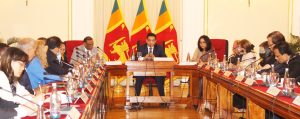In a statement to ANI on September 25, Foreign Minister Ali Sabry accused Canada of harboring terrorists and criticized Canadian Prime Minister Justin Trudeau for baseless allegations against India.
“Some of the terrorists have found safe haven in Canada,” a reference to front organizations of the Liberation Tigers of Tamil Eelam (LTTE) operating from Canadian soil, despite Canada officially proscribing the LTTE in 2006.
The Canadian prime minister made “some outrageous allegations without any supporting proof,” Sabry said.
On September 18, Trudeau told the Canadian Parliament that his government was “actively pursuing credible allegations” linking Indian government agents to the killing of Hardeep Singh Nijjar, a Sikh separatist leader and Canadian citizen, in British Columbia in June. India had labeled Nijjar a terrorist for advocating Khalistan, an independent Sikh state, and dismissed the murder allegation as baseless. India-Canada relations have deteriorated significantly since.
They did “the same thing… against Sri Lanka,” Sabry said, pointing to the “terrible, total lie” perpetuated by Western countries that Sri Lanka had carried out “a genocide” in the final stages of the civil war. “Everybody knows there was no genocide in our country,” the Sri Lankan foreign minister asserted.
Sabry also drew attention to Trudeau’s recent honoring of a Ukrainian who fought alongside the Nazis during the Second World War. “Sometimes PM Trudeau comes out with outrageous and substantiated allegations,” he said.
Sabry’s comment, seen as an attempt to align Sri Lanka with India, has drawn both support and criticism domestically. It raises questions about the potential long-term benefits and risks for Sri Lanka amid regional diplomatic tensions.
It is not often that Sri Lanka openly weighs in on disputes between other nations. Apart from its support for the Palestinians, Sri Lanka usually responds to any crisis with a watered-down statement calling for peace and quick resolution to hostilities.
However, Sabry’s outspoken stance on the Canada-India spat has evoked concern both in the media and political circles, as his remarks could strain relations with Canada, a historical supporter of U.N. resolutions against Sri Lanka. Earlier this year, Canada imposed sanctions on four high-ranking Sri Lankan officials, including former executive Presidents Mahinda Rajapaksa and Gotabaya Rajapaksa.
An editorial in Daily Mirror criticized Sabry for interfering in a conflict between India and Canada, deeming it irrelevant to Sri Lanka’s national interests.
Despite the potential fallout, recent trends indicate Sri Lanka’s efforts to strengthen ties with India. A senior diplomat revealed that the foreign ministry has allocated 80 percent of its resources to improve relations with India, recognizing the geopolitical importance of a strong partnership. For example, Sri Lanka would always have a hard time accessing Chinese technical and financial assistance, vital for converting the country into a logistics hub, unless India is convinced that Sri Lanka poses no threat to its national security. Given this context, Sabry’s statement can be seen as an attempt to convince India that Sri Lanka is aligned with India.
Uditha Devapriya, the lead researcher at Colombo-based foreign policy think-tank Factum, views Sabry’s interview as a strategic move to win India’s favor. Despite Sri Lanka’s relatively minor role in the international system, Sabry’s statements garnered wide publicity in the Indian media, potentially winning over influential sections of the Indian establishment.
Devapriya suggests that such support from Sri Lanka could be instrumental for India, especially at the United Nations Human Rights Council (UNHRC), where Canada is expected to lead efforts against Sri Lanka.
Some Indian journalists have drawn parallels between Canada’s approach to the LTTE and Sikh separatist movements, noting similarities in the alleged involvement of such groups in influencing Canadian policies.
Pointing out that even the Indian vernacular press had given prominence to Sabry’s critique of Trudeau, Devapriya observed that “at least in the short-term [Sabry’s statement] can lead to a lot of goodwill from the Indian side. Sri Lanka needs Indian support at the UNHRC” when Sri Lanka’s human rights record is debated.
“Canada will lead the charge against Sri Lanka at the UNHRC and India of course can act as a counterbalance,” Devapriya said. “This is probably what Sabry was thinking.”
However, Asanga Abeyagoonasekera, a noted Sri Lankan geopolitical analyst and senior fellow at The Millennium Project, criticized the foreign minister for weighing in on the Canada-India dispute, characterizing it as a serious error in judgment.
Sabry “decided to piggyback on the crisis equating Sri Lanka’s concerns with Canada on sheltering LTTE,” he said.
Abeyagoonasekera argued that Sabry’s attempt to link Sri Lanka’s concerns with Canada to its sheltering of the LTTE with its issues with India is fundamentally flawed. “This misstep,” according to Abeyagoonasekera, could further antagonize nations in the Five Eyes alliance, particularly on matters related to the Easter Sunday attack allegations and human rights concerns raised by the UNHRC.
“On the Tamilian human rights, India will always take a pro-Tamilian position due to the domestic political constraints,” Abeyagoonasekera said.

































